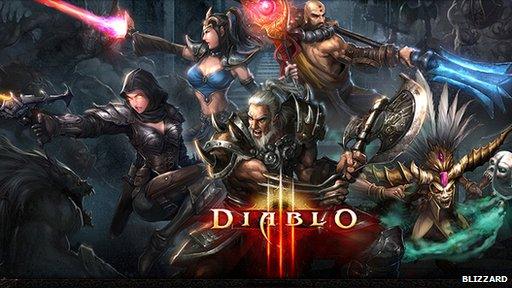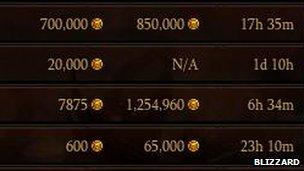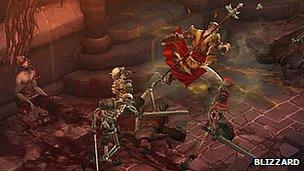Diablo 3's real-money auctions attract get-rich cheaters
- Published

Diablo 3 broke PC sales records with more than 3.5 million copies sold in the game's first 24 hours
In sheer sales terms there's no doubt Diablo 3 has been a big success. Blizzard, the creator of the game, claims it is the fastest-selling PC game so far.
But the jury is still out on whether one aspect of the game, its real-money auction house, is the success that Blizzard wants, and perhaps needs, it to be.
In the UK, the company pockets a £1 fee per item sold in the real-money auctions and 15% of the final sale price for commodities, including gold.
For fans of that other Blizzard success, World of Warcraft (Wow), letting players spend real money to buy gear for their character is decidedly odd. Blizzard explicitly bans Wow players buying and selling gear outside the game. Those caught, risk losing their account.
Not so in Diablo 3 - almost every item can be traded for in-game gold or sold for real-world cash, provided you can find a buyer.

Some items are commanding very high prices on the Diablo 3 auction house
Ladan Cockshut, who is studying online game culture for a PhD, said Blizzard probably took the decision to create the real-money auction house after off-game Wow transactions continued to take place despite its rules.
"There are a few people I know who have bought characters and gear through an unofficial channel," said Ms Cockshut. "A lot of them had real problems as a result."
Legitimising the trading of gear would help overcome some of these problems, said Ms Cockshut, even though some players might not like it because it changed the dynamics of the game.
Instead of good gear being earned by time spent playing in the game and thus was a symbol of that player's commitment, it meant players could just buy what they need, she said.
Games consultant Markus Eikenberry said, with the auction house, Blizzard was trying to satisfy the very different needs of players.
"There's a lot of people that want to play and have money but no time and want to pay to accelerate themselves," he said.
"And there's a lot of people that have time and no money so it's a marriage made in heaven as the auction house lets them can play and earn."
Money farmers
However, the auction house in Diablo 3 has stirred huge interest from the so-called gold farmers.
These players make a living by building up huge reserves of the virtual currencies used in popular games. They then sell this for real cash in the game, if possible, or on grey markets if there is no in-game auction house.
Some have gone to great lengths to cash in. Mr Eikenberry <link> <caption>recorded an interview with one farmer</caption> <url href="http://markeedragon.net/abridged-diablo-iii-farmer-makes-60-million-gold-an-hour-and-tells-all/" platform="highweb"/> </link> who was simultaneously running 100 Diablo accounts and claimed to be making about 60 million game gold (about $90, £58) an hour.
The farmer contacted Mr Eikenberry because he wanted Blizzard to fix some of the exploits he was using to cash in. The sheer number of exploits meant rampant inflation was causing the exchange rate of game gold to real cash to crash.
Mr Eikenberry said the farmer was in the "medium range" of those exploiting the game. There were likely to be others running many more accounts, most of which were stolen from other players, and making lots more game cash.
Diablo 3 was proving so tempting to the farmers, he said, because it legitimised what they did.
"Every farmer dreams of going legit and being able to do business without someone trying to stop them," he told the BBC.
"I'd say 90% of the farmers out there are looking at Diablo 3 right now."
This was causing real problems for Blizzard because, he said, Diablo 3 was not designed to be played for hours and hours and hours.
Blizzard had banned some accounts for the most blatant abuse and updated the game several times to make it much harder to exploit. But, said Mr Eikenberry, it would have to keep vigilant to ensure the game was not overwhelmed.

Zynga has banned players from Mafia Wars, which is free to join but involves "premium" paid-for content
"I can see a lot of the pain they are going through. I knew they were going to have a bunch of these problems," he said. "Diablo 3 is the first really big title to do a real-money auction house."
But Blizzard is not only the company to take steps to tackle players attempting to unfairly profit from games.
Zynga's chief technology officer recently told the BBC about efforts to tackle "cheats" at two of its most popular titles.
"There was a UK-based hacker in poker who was trying to get chips and sell them on the black market at a discount to what we sell them for," said Cadir Lee.
"We ultimately tracked him down and were successful in prosecuting him.
"In Mafia Wars... where there have been exploits, we respond and take action. We try and do things to slow down botters [computer controlled accounts]. But it can be hard to differentiate a botter from an actual player.
"We decide what is a reasonable rate that a human could do and set an upper limit. If someone goes beyond that, we flag it as being suspicious. Our first choice is to program in limits... but in extreme cases we have banned people, and you can go on our forums and see people who complain about that."

Players battle skeletons and other demonic forces as they progress through Diablo 3
Zynga has plans to introduce real-cash gambling elements into future games and is following Diablo's progress.
Others too are likely to adapt their plans depending on the level of success of Diablo 3's auction house.
The sheer number of massively multi-player online games (MMOs) already available means competition is fierce.
Mr Eikenberry said this made it hard for titles to survive on subscription models alone.
"There are two more coming out this year I'm consulting on that are going to primarily earn their funding through peer-to-peer transactions and both are MMOs," he said.
- Published13 June 2012
- Published10 November 2011
- Published8 April 2011
- Published29 July 2011